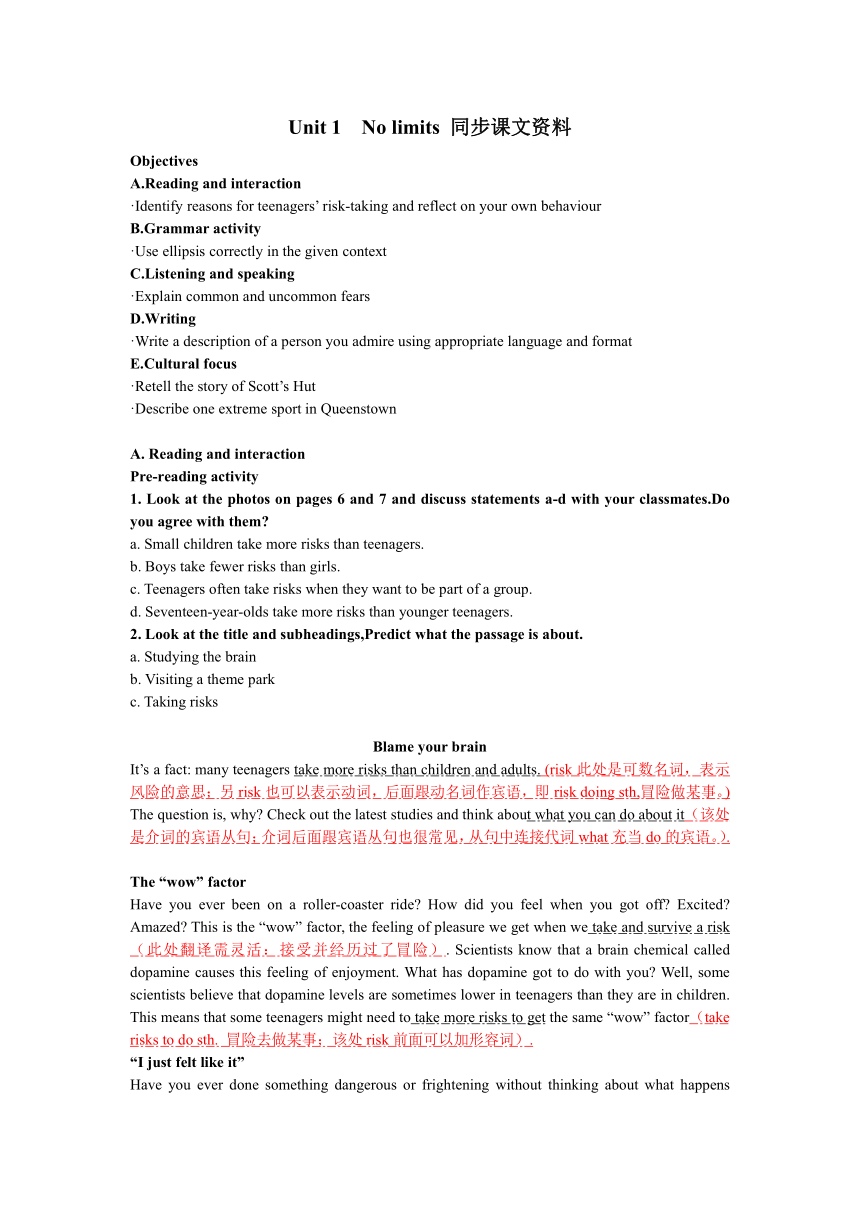
中小学教育资源及组卷应用平台 Unit 1 No limits 同步课文资料 Objectives A.Reading and interaction ·Identify reasons for teenagers’ risk-taking and reflect on your own behaviour B.Grammar activity ·Use ellipsis correctly in the given context C.Listening and speaking ·Explain common and uncommon fears D.Writing ·Write a description of a person you admire using appropriate language and format E.Cultural focus ·Retell the story of Scott’s Hut ·Describe one extreme sport in Queenstown A. Reading and interaction Pre-reading activity 1. Look at the photos on pages 6 and 7 and discuss statements a-d with your classmates.Do you agree with them? a. Small children take more risks than teenagers. b. Boys take fewer risks than girls. c. Teenagers often take risks when they want to be part of a group. d. Seventeen-year-olds take more risks than younger teenagers. 2. Look at the title and subheadings,Predict what the passage is about. a. Studying the brain b. Visiting a theme park c. Taking risks Blame your brain It’s a fact: many teenagers take more risks than children and adults. (risk此处是可数名词,表示风险的意思;另risk也可以表示动词,后面跟动名词作宾语,即risk doing sth,冒险做某事。) The question is, why? Check out the latest studies and think about what you can do about it(该处是介词的宾语从句;介词后面跟宾语从句也很常见,从句中连接代词what充当do的宾语。). The “wow” factor Have you ever been on a roller-coaster ride? How did you feel when you got off? Excited? Amazed? This is the “wow” factor, the feeling of pleasure we get when we take and survive a risk(此处翻译需灵活:接受并经历过了冒险). Scientists know that a brain chemical called dopamine causes this feeling of enjoyment. What has dopamine got to do with you? Well, some scientists believe that dopamine levels are sometimes lower in teenagers than they are in children. This means that some teenagers might need to take more risks to get the same “wow” factor(take risks to do sth. 冒险去做某事;该处risk前面可以加形容词). “I just felt like it” Have you ever done something dangerous or frightening without thinking about what happens next? When an adult asks a teenager, “What were you thinking of when you did that?” a common reply is, “I just felt like it.” But the question misses the point(miss the point,错过要点), because the point is that the teenager might not have been thinking at all The teenager didn’t plan to take a risk(该句是一个表语从句;表语从句使用的是现在完成进行时,表示动作从过去一致持续到现在并有可能继续持续下去。): it just “happened”. A few years ago, scientists made a surprising discovery: the teenage brain goes through(go through是经历的意思;另外还有检查的意思,也比较常见) many physical changes, and some parts of it develop later than others. The last part to fully develop is the frontal cortex. This is the area of the brain which allows us to do things such as controlling feelings and ma good decisions(本单元的语法点是省略;省略的一种情况是在定语从 ... ...
~~ 您好,已阅读到文档的结尾了 ~~

